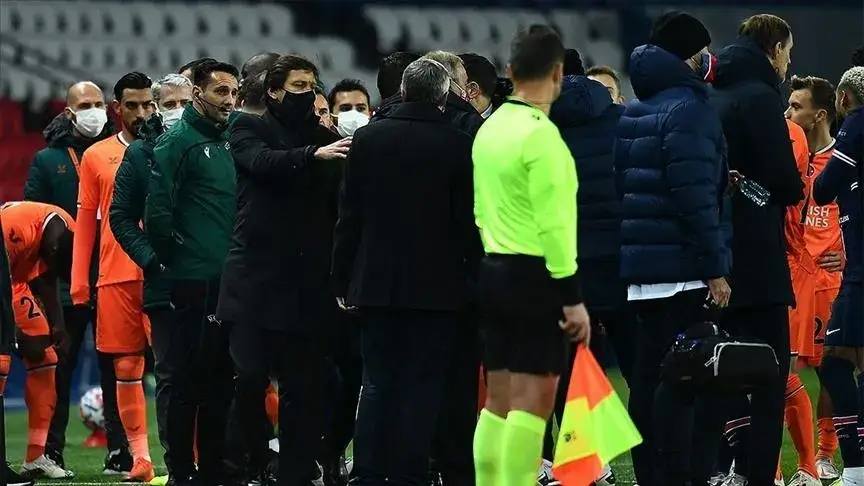Football is a game full of passion and unexpected turns. The drama of football events often goes far beyond the playing field, leaving an indelible mark on the history of the sport. Conflicts and controversial situations are often remembered for many years – they are so vivid. In this article, we will tell you about the most scandalous matches in the history of football. These are five interesting stories that cannot be ignored.
1. “The Battle of Santiago”: when football turned into a war
“The Battle of Santiago” is a meeting that is impossible to forget. It demonstrated how tensions off the field can ignite conflicts between teams to the limit.

What happened?
On June 2, 1962, the national teams of Chile and Italy met in Santiago at the World Cup. Italian journalists called the homeland of the Chileans “a backward country”, which caused indignation among residents. These statements added political tension before the match. More than 66 thousand fans gathered at the stadium, expecting not only a football confrontation, but also the defense of national honor.
From the first minutes of the match, players from both teams began to use brute force. Elbow strikes, trips and outright provocations led to constant stoppages of the game. The referee sent off Giorgio Ferrini after his violent collision with a Chilean player, and later Mario David received a red card for hitting an opponent. Left with nine players, the Italian team was unable to withstand the onslaught of the opponent, and the game ended with a 2-0 victory for Chile.
The event became an example of how political and cultural conflicts can escalate into a physical confrontation on the field. The most scandalous match went down in football history as an illustration of not only sports, but also social tensions.
Details:
- Final score: 2-0 in favor of Chile.
- Two Italian players were sent off for rudeness.
- Political overtones that heightened tension in the stands.
- The referee completely lost control of the game, which intensified the unrest.
2. “The Hand of God”: genius or swindler?
The Argentina-England match at the 1986 World Cup was a real test of loyalty to football principles. The meeting was remembered for two moments that went down in the annals of world sport.
Details
On June 22, 1986, Argentina and England met in the quarter-finals of the World Cup at the Azteca stadium in Mexico City. Diego Maradona, the captain of the Argentine team, became the main hero of this meeting.
In the 51st minute, the footballer scored the first goal with his hand. The referee, who did not notice the violation, counted the goal, causing indignation among the English players. Four minutes later, Maradona proved his genius by making a solo run through five defenders and the goalkeeper, finishing with an accurate strike. This goal was called the “Goal of the Century”. The game ended with Argentina winning 2-1, allowing the team to advance to the semi-finals.
The episode became a symbol of football’s ambiguity, where cunning and skill can coexist. The most controversial match in football history continues to stir controversy, demonstrating that the sport does not always follow strict rules.
Details:
- The first goal was scored with a hand, which caused a scandal.
- The second goal was recognized as “the best in the history of the World Cup.”
- The final score: 2-1 in favor of Argentina.
- The match increased tensions between the two countries after the Falklands War.
3. “Heysel Massacre”: the tragedy that changed football
 The competition turned into a tragedy that forever changed the rules for organizing football tournaments. The 1985 Champions League final remains a dark chapter in sports history.
The competition turned into a tragedy that forever changed the rules for organizing football tournaments. The 1985 Champions League final remains a dark chapter in sports history.
How and why?
On May 29, 1985, Juventus and Liverpool met in the Champions League final at the Heysel Stadium in Brussels. Before the match began, provocations from the team’s fans led to a stampede in the stands. The clashes caused the wall surrounding the section to collapse, killing 39 people and injuring over 600.
Despite the tragedy, the match went ahead. Juventus won 1-0 thanks to Michel Platini’s penalty. The joy of victory was overshadowed by the horror of defeat, forcing UEFA to implement strict security measures. English clubs are banned from participating in European competitions for five years.
This tragedy changed the way football competitions are organized forever. The most controversial match in football history became the starting point for the introduction of new safety standards in stadiums.
4. Fight at Old Trafford: Referees under fire
The 2013 match between Manchester United and Real Madrid sparked a wave of outrage and became an example of how a single refereeing decision can change the outcome of a match.
Details
On March 5, 2013, Manchester United hosted Real Madrid in the Champions League round of 16. In the 56th minute of the match, referee Cakir Nani sent off for a foul, causing considerable controversy. Up to that point, Manchester United were leading 1-0 and had the game under control.
After the sending off, Real increased the pressure. Luka Modric equalized with a superb shot from outside the box, and Cristiano Ronaldo scored the winner to make it 2-1 for Madrid. This match shows how a referee’s actions can affect the outcome of a tournament. The most scandalous match in football history reminded us of the importance of professional referees.
Details
- Nani was sent off in the 56th minute.
- Winning goals from Luka Modric and Cristiano Ronaldo.
- The final score was 2-1, securing Real Madrid’s place in the quarterfinals.
- Criticism of the referee and debates about the fairness of decisions.
5. Racism scandal in Paris
On December 8, 2020, PSG and Istanbul Basaksehir met in the Champions League. The referee made a racist remark to one of the coaches, which sparked an outcry. Players from both teams left the field and refused to continue the game.
The match resumed the next day with a change in the refereeing team. PSG won 5-1, but the outcome of the match remained unclear. The football community actively supported the protesters, and UEFA stepped up its efforts to combat discrimination.
The meeting became an example of solidarity and integrity. The most controversial match in football history demonstrated the importance of the fight for equality.

Conclusion
 Each of the most controversial matches in football history is a reminder of the power of emotions, the impact of sport on society, and the importance of upholding the principles of fair play. At these events, not only the athletes but also millions of fans around the world learn to respect one another and value safety and solidarity, making football a true art.
Each of the most controversial matches in football history is a reminder of the power of emotions, the impact of sport on society, and the importance of upholding the principles of fair play. At these events, not only the athletes but also millions of fans around the world learn to respect one another and value safety and solidarity, making football a true art.
 en
en  de
de  ar
ar  es
es  nl
nl  hi
hi  fr
fr  it
it  pt
pt  el
el 









